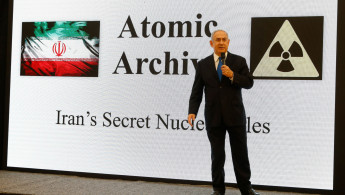World powers respond to Netanyahu's 'nuclear Iran' claims
"The pertinence of the deal is reinforced by the details presented by Israel: all activity linked to the development of a nuclear weapon is permanently forbidden by the deal," said a foreign ministry spokesperson.
Israel's premier 'revealed' on Monday that he had proof of a secret Iranian nuclear weapons programme, giving a presentation live on television allegedly detailing Tehran's alleged plans to go nuclear.
The Israeli leader has promised to hand over intelligence on Iran to the International Atomic Energy Agency (IAEA), however observers believe that it is unlikely to contain anything new.
US President Donald Trump justified his criticism of the Iran deal using the Israeli leader's claims.
While the French foreign ministry said that the details needed to be "studied and evaluated", a spokesperson added that the evidence did not appear to contain anything new.
"At first sight, they (the details) confirm that part of the Iranian nuclear programme, as France and its partners stated during the first revelations in the summer of 2002, was not civilian," said the spokesperson in a statement received by AFP.
"The inspection regime put in place by the IAEA thanks to the deal is one of the most exhaustive and the most robust in the history of nuclear non-proliferation," the statement added.
French President Emmanuel Macron - along with other EU leaders - had urged Trump to abide by the nuclear accord, arguing that it is the only viable option available to the international community.
The EU also dismissed Israel's allegations, with diplomatic chief Federica Mogherini saying that Netanyahu's allegations do "not put into question" Tehran's compliance with the 2015 nuclear deal.
Emphasising she was giving a preliminary reaction, Mogherini also stressed the IAEA needed to assess the Israeli claims.
"The IAEA is the only impartial, international organisation that is in charge of monitoring Iran's nuclear commitments."
"What I have seen from the first reports is that Prime Minister Netanyahu has not put into question Iran's compliance with the JCPOA (Joint Comprehensive Plan of Action) commitments, meaning post-2015 nuclear commitments," she added.
"I have not seen from Prime Minister Biyamin Netanyahu arguments for the moment on non-compliance, meaning violation by Iran of its nuclear commitments under the deal," Mogherini said.
"Iran has fully complied with its commitments," according to ten reports from the IAEA, she said.
The nuclear watchdog reiterated on Tuesday that there was "no credible indications of activities in Iran relevant to the development of a nuclear explosive device after 2009".
A spokesperson for IAEA said in a statement that its board of governors had "declared that its consideration of this issue was closed" after it was presented with a report in December 2015.
Iran has warned that there would be "severe consequences" if the US were to walk away from the deal, saying that they are "prepared for all possible situations".
The head of Iran's Atomic Energy Organisation said that the Islamic Republic has the technical capability to enrich uranium to a higher level before a deal to curb its nuclear programme could be reached.
Ali Akbar Salehi warned against Trump's current course of action.
"Iran is not bluffing. Technically, we are fully prepared to enrich uranium higher than we used to produce before the deal was reached. I hope Trump comes to his senses and stays in the deal," he said.
Under the deal, Iran's level of enrichment must remain around 3.6 percent.
Trump is also eyeing a broader pact that also limits Iran's ballistic missile programme and support for armed groups across the Middle East.
France and other European nations are battling to save the complex nuclear deal with Iran, which Trump will scuttle if he refuses to waive sanctions against Tehran by the 12 May deadline.
Tehran ruled out any possibility of meeting Trump's demands.





 Follow the Middle East's top stories in English at The New Arab on Google News
Follow the Middle East's top stories in English at The New Arab on Google News

![22 Arab countries at COP29 have rejected the targeting of fossil fuels [Getty]](/sites/default/files/styles/image_330x185/public/2024-11/GettyImages-2184289638.jpg?h=199d8c1f&itok=ptHl5bec)
![Dozens of people turned out for the funerals [Getty]](/sites/default/files/styles/image_330x185/public/2024-11/GettyImages-2185229760.jpg?h=e7c891e8&itok=1bctDcE6)